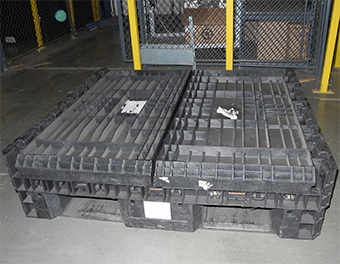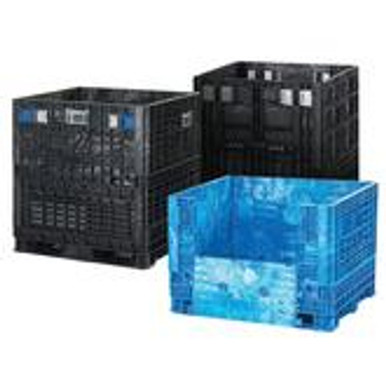The Ultimate Guide to Picking the Right Mass Containers for Your Business Demands
Choosing the appropriate bulk containers is essential for any kind of business that counts on efficient logistics. Different types of containers exist, each designed for details materials and applications. Factors such as size, product compatibility, and regulative requirements play a substantial role in this decision-making procedure. Comprehending these components can bring about boosted functional effectiveness. Numerous services forget essential elements that can boost their general performance and sustainability. What are these considerations?
Understanding Different Kinds of Bulk Containers
Mass containers act as essential tools for companies looking for effective storage space and transportation solutions. These containers can be found in various kinds, each designed to fulfill details operational demands. One usual type is the intermediate mass container (IBC), which is suitable for granulated and fluid materials, supplying an equilibrium of capability and ability to move. Another popular alternative is the bulk bag, or FIBC, suitable for completely dry, flowable products. These flexible containers are lightweight and can be quickly carried and saved. For much heavier materials, rigid mass containers are often used, supplying toughness and security for safe handling. Furthermore, there are specific containers tailored for dangerous products, making sure conformity with safety and security laws. Understanding the distinct features of these mass container types enables companies to make informed decisions that optimize logistics and minimize expenses. By picking the best container, business can boost their functional effectiveness and improve their supply chain processes.
Key Material Factors To Consider for Bulk Containers
When selecting mass containers, it is necessary to consider the products used in their building and construction. Elements such as strength, toughness, and chemical compatibility play an essential function in guaranteeing the containers fulfill particular functional needs. In addition, weight and mobility concerns can affect both performance and transportation logistics.
Material Toughness and Stamina
Sturdiness and strength are essential consider picking products for bulk containers, as they straight influence the container's capability to stand up to numerous ecological problems and managing procedures. Materials such as high-density polyethylene (HDPE), polypropylene, and stainless-steel are typically favored for their robust homes, using resistance to temperature level, abrasion, and impact fluctuations. The choice of material likewise affects the overall life-span of the container; stronger products usually result in less regular substitutes, causing cost financial savings over time. Furthermore, the weight of the product can affect shipping prices and simplicity of handling. Businesses should consider their specific operational atmospheres and the capacity for damage to assure peak sturdiness and stamina in their mass container choice.
Chemical Compatibility Elements
Recognizing chemical compatibility is essential for selecting bulk containers, as the materials made use of have to withstand the specific materials they will hold. Different factors affect compatibility, including the chemical nature of the materials, temperature, and duration of storage space. For instance, destructive chemicals might call for containers made from stainless-steel or specialized plastics that resist degradation. Furthermore, responsive substances can generate warm or gases, necessitating aired vent or pressure-rated containers. The choice of container product, whether polycarbonate, polyethylene, or metal, should straighten with the chemical buildings of the kept compounds to stop leakages or violations. Inevitably, a detailed analysis of these compatibility variables assures risk-free handling and storage, safeguarding both personnel and the atmosphere while maintaining item integrity.
Weight and Transportability Issues
Picking bulk containers entails not only assessing chemical compatibility but likewise considering weight and mobility. Organizations have to analyze the ease of handling and transportation to optimize efficiency. Lightweight products like high-density polyethylene (HDPE) or aluminum can assist in simpler activity and lower delivery prices. Alternatively, much heavier containers might supply enhanced sturdiness however can prevent mobility, specifically in environments needing regular moving. Furthermore, the design of the container need to permit hassle-free training and piling, guaranteeing ergonomic security for workers. Business need to also think about the facilities offered for transportation; for instance, containers compatible with forklifts or pallet jacks can enhance procedures. Inevitably, the right balance between weight and mobility directly influences functional performance and expense effectiveness.
Sizing Your Bulk Containers for Optimum Efficiency
When sizing mass containers, companies need to carefully examine the measurements called for to suit their certain items. Additionally, weight ability is an important element that affects effectiveness and safety and security throughout transportation and storage space. Efficient sizing not only makes best use of space yet likewise enhances operational workflows.
Identifying Container Dimensions
Selecting the right measurements for bulk containers is essential for taking full advantage of efficiency in storage and transportation. Businesses need to evaluate their certain requirements, taking right into account factors such as available room, the nature of the goods being stored, and the techniques of transport utilized. Exact dimensions assure that containers fit ideally in storehouses and automobiles, reducing thrown away space and decreasing taking care of time. Criterion sizes can provide ease, however personalized dimensions might be needed for unique needs or to fit specific items. Furthermore, it is crucial to review piling capabilities and ease of access, as these elements affect general operational efficiency. Eventually, the ideal measurements cause enhanced company and streamlined logistics, profiting the general performance of the service.
Weight Capability Considerations
Comprehending weight ability is crucial for companies intending to enhance their bulk container effectiveness. The weight capacity of a container straight affects storage space capabilities, transport logistics, and general operational costs. Choosing containers with the appropriate weight restrictions assures that organizations can securely store Check Out Your URL and move their products without taking the chance of damage or compliance issues. Straining containers can lead to structural failures, while underutilizing capability outcomes in squandered sources. When selecting containers, it is vital for companies to assess their item weights and take into consideration any kind of regulatory demands. In addition, aspects such as the kind of material, intended usage, and ecological problems must likewise influence weight capacity decisions. By evaluating these components, organizations can improve efficiency and assure a structured supply chain.
Regulative Compliance and Security Standards

Governing conformity get redirected here and safety standards play an important function in the choice of mass containers for businesses. Organizations has to ensure that their containers meet numerous policies established by local, nationwide, and international authorities. These standards often relate to product security, architectural honesty, and appropriate labeling, which aid stop crashes and guarantee the safe transportation of items.
Additionally, adherence to industry-specific guidelines, such as those from the Fda (FDA) or the Occupational Safety And Security and Wellness Management (OSHA), is critical for business dealing with unsafe materials or foodstuff. Non-compliance can result in penalties, legal problems, or damages to a company's online reputation.
Organizations should also consider the container's compatibility with the materials being stored or transferred to stay clear of contamination or chemical responses (used collapsible bulk containers). To summarize, comprehending and applying regulatory compliance and safety requirements is necessary for the liable and reliable usage of mass containers
Sustainability Alternatives for Eco-Friendly Mass Containers

Companies are also discovering alternatives made from recycled materials, which not just preserve resources but also support the reusing industry. Additionally, advancements in style permit lighter containers that need much less energy to transport, even more boosting sustainability. By integrating these green mass container alternatives, services can show their dedication to ecological stewardship while meeting consumer demand for lasting methods. This change not only aids the earth but find can also boost brand name reputation and client commitment.
Cost-Effectiveness and Budgeting for Bulk Containers
While numerous businesses concentrate on sustainability, cost-effectiveness remains a crucial variable when choosing mass containers. Organizations has to examine the initial acquisition price, in addition to lasting operational costs, to ensure monetary practicality. Variables such as upkeep, sturdiness, and reusability play a substantial function in establishing general expenses.
Investing in high-quality containers might generate higher ahead of time prices but can cause cost savings through decreased substitute rates and lowered waste. Furthermore, services need to consider transport prices and storage space effectiveness, as these can influence the overall budget plan.

Regularly Asked Inquiries
Exactly how Do I Identify the Right Container for Hazardous Materials?
To figure out the right container for unsafe materials, one need to evaluate compatibility with the substance, think about the container's product, look for governing compliance, and examine ability and safety and security attributes to guarantee proper handling and storage.
Can Bulk Containers Be Personalized for Particular Products?
Yes, bulk containers can be tailored for certain items. used collapsible bulk containers. Different features, such as style, product, and size, can be customized to meet one-of-a-kind requirements, guaranteeing optimal safety and performance for moving and storing different products
What Is the Average Life Expectancy of Various Mass Container Types?
The average life expectancy of bulk container kinds differs; plastic containers last 5-10 years, steel containers 10-20 years, and wood containers normally last 3-7 years, depending upon usage, maintenance, and environmental conditions.
Exactly how Should I Tidy and Maintain Bulk Containers?
To cleanse and preserve bulk containers, one must frequently examine for damages, get rid of residue, laundry with suitable detergents, rinse extensively, and assurance proper drying prior to storage. Complying with supplier standards improves longevity and safety and security during use.
Are There Rental Alternatives for Bulk Containers Available?
Yes, countless business offer rental alternatives for bulk containers, providing adaptability for organizations. These services can accommodate different needs, enabling business to handle inventory efficiently without the dedication of purchasing containers outright.
Sturdiness and strength are important elements in choosing products for mass containers, as they directly affect the container's capacity to endure numerous environmental problems and handling procedures. Recognizing chemical compatibility is necessary for picking bulk containers, as the materials made use of need to withstand the specific compounds they will hold. Recognizing weight capability is vital for companies intending to maximize their bulk container performance. Regulatory compliance and safety requirements play an essential function in the selection of bulk containers for companies. While lots of organizations focus on sustainability, cost-effectiveness stays a crucial element when selecting bulk containers.